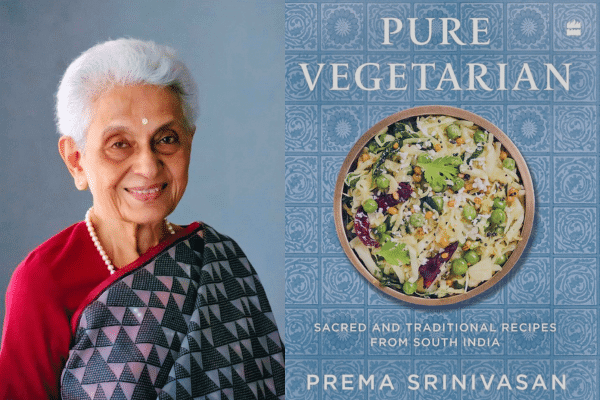I may be a Mumbai-based Maharashtrian – with ancestral roots in Konkan – but I have a deep fascination for South Indian cuisines. Over and above the staples of crunchy dosas, warm uttapams and soft idlis, I always knew there was more to the food from this part of India.
Over the last decade, my curiosity and love for the cuisines grew during my travels to various southern regions. Each visit revealed something new — flavours and ingredients that made me fall in love with not just the food but also the people who cooked it. The warmth of their kitchens, the precision in their cooking, and the cultural pride they carried with every meal truly touched the soul.
So, when I picked up Pure Vegetarian: Sacred and Traditional Recipes from South India by Prema Srinivasan, I expected more than just a cookbook. I sought a deeper connection with the cultural and culinary traditions I’ve come to admire.
Srinivasan’s book goes beyond mere recipes, weaving in cultural and historical insights highlighting the vegetarian traditions of her orthodox Mylapore home in Chennai. The author not just records delicious cuisines of southern India, but also reflects on how modern influences from other parts of the country and the West have reshaped this food culture over time.
Sacred Offerings

In the first chapter of Pure Vegetarian on ‘Sacred Offerings’, Prema Srinivasan lists an extensive range of recipes – 22 in total and linked to different temples, where they are considered special to the deities residing there. Some of these include highly-skilled preparations like Akkara Adisil (sweet rice with green gram) and Tiruvadirai Kali (broken rice with jaggery) to simpler dishes like Kondakadalai Sundal (whole Bengal gram dal sundal) and Dadhiyodanam (curd rice).
These sacred offerings are significant during auspicious occasions – either prepared for deities in the temples or for those residing in one’s own home.
In a Srivaisnava household – a South Indian Brahmin community the author belongs to – food offered to the deities is different on different days. For instance, Srinivasan writes, cooked rice with a little ghee is offered to the family deity on ordinary days. But on festival days, a more elaborate meal is prepared. On Rama Navami, the deities are served panakam (a spiced jaggery drink) and thin buttermilk. On Vinayaka Chaturthi day, kolukattai (rice dumplings or modaks) are made.

Dishes listed in this section that particularly stand out for me include: teraliappam (cinnamon-flavoured rice appam), tiruvallikeni puliyodara (tamarind rice), selvarappam (crisp fried patties), and sukhiyan (sweet balls with coconut and jaggery filling).
Srinivasan neatly details recipes of these 22 dishes. So much so, that even occasional cooks can whip up some of these dishes. That’s the beauty of this book, really. Even first-time cooks can try a few recipes, while other more complex ones are meant for the professionals.
Pure Vegetarian: Cosmopolitan currents
Perhaps most striking however, was how this book not only preserves the essence of traditional South Indian vegetarian cuisine but also acknowledges the ever-evolving identity of vegetarians in modern India.
The chapter ‘Cosmopolitan Currents’ discusses how changing times have reflected in our homes, in the food we all cook and eat. The modern kitchen gadgets have changed the traditional flavours of our food. Remember how Indian recipes mainly depended on the grinding and powdering processes? Our great grandmothers did it, grandmothers too, and then our mothers!
Over time, however, these traditions are lost. But Prema Srinivasan seems slightly hopeful as she writes: “Will India rediscover and retain its culinary pride in the way that some parts of Europe continue to do, where ‘slow food’, family meals, and enlightened conversation around the dining table are indicative of the quality of life that cannot be comprised?”

Srinivasan, who passed away in 2022, grew up in a middle-class Tamil house, where food was an integral part of her life. In this book, she weaves in personal anecdotes from her own life in Chennai and Madurai, bringing alive the smells, sounds and rituals of a Tamil household! We say, give it a read.
For details about the book, head here
READ MORE: Vegetarian can be yummy





